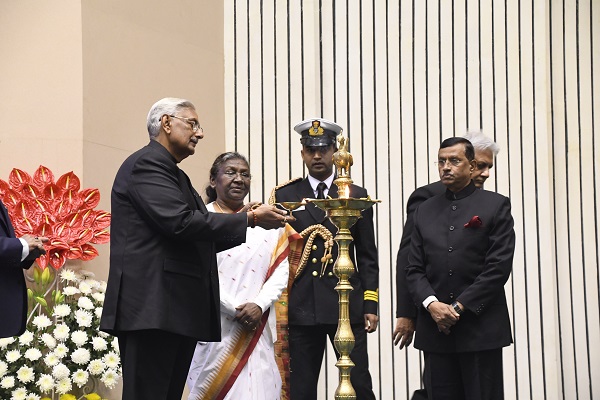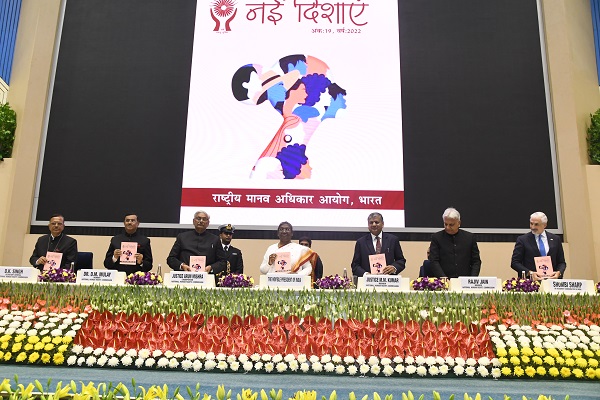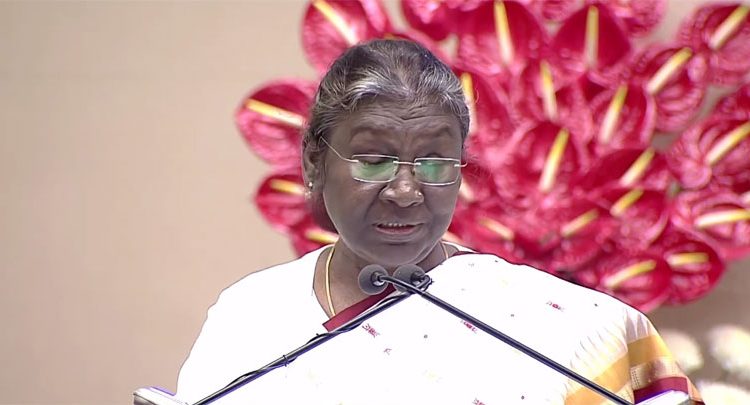Enactment of Common Civil Code necessary to end discrimination of women in society, says NHRC Chairperson, Mr. Justice Arun Mishra
New Delhi: The National Human Rights Commission, NHRC, India today organized a function in New Delhi to celebrate Human Rights Day marking the beginning of the worldwide, year-long celebrations of the 75 years of the Universal Declaration of Human Rights (UDHR). Addressing the gathering as the Chief Guest, the President of India, Mrs. Droupadi Murmu said that considering the sad developments, which keep taking place in many parts of the world, we wonder if the declaration, translated into more than 500 languages, has been read at all in some of those languages.
The President said that in India, we can take solace in the fact that the National Human Rights Commission has been making the best possible efforts to spread awareness about them. Now in its 30th year, the NHRC has done a commendable job of protecting as well as promoting human rights. India is proud of the fact that its work has been appreciated internationally.

She said that developing sensitivity and sympathy is the key to promoting human rights. There is a so-called ‘golden rule, which says “Treat others as you would like them to treat you”. Just as the concept of human rights exhorts us to consider every human being as no different from us, we should treat the whole living world and its habitat with respect. That sums up the human rights discourse beautifully.
Mrs. Murmu said that over the past few years, the world has suffered from a high number of natural disasters caused by unusual weather patterns. Climate change is knocking on the doors. People in the poorer nations are going to pay a heavier price for the degradation of our environment. We must consider the environmental dimension of justice now.
The President said that the challenge of climate change is so enormous that it forces us to redefine ‘rights’. We must learn – rather re-learn – to treat nature with dignity. This is not only a moral duty; it is necessary for our own survival too.
The Prime Minister of India, Mr. Narendra Modi in his message on the occasion of Human Rights Day, read out by NHRC Member, Mr. Justice M. M. Kumar, said that the “Theme of this year’s Human Rights Day-“Dignity, Freedom and Justice for All” is extremely meaningful and apt.” Indian philosophy and culture have always been a strong proponent of respecting every from the life. In fact the Fundamental Rights enshrined in our Constitution capture the very essence of basic human rights.

He said that the Government of India is working unflinchingly towards building an inclusive and equitable society, with rule of law, justice, equality and fairness being its pillars. We have taken a series of steps to remove all barriers of discrimination. As India assumes the presidency of G20, we also have a chance to showcase our values of rights and respect for everyone.
The Home Minister, Mr. Amit Shah in his message, read out by the NHRC Member, Dr. D. M. Mulay, said that Human Rights Day gives an opportunity to reflect on the meaning of being a human and our role in enhancing the basic dignity of mankind. He expressed the hope that all the citizens of India will rise above discrimination and protect the human rights of all.

Earlier, the NHRC Chairperson, Mr. Justice Arun Mishra reiterated the commitment of the NHRC towards the promotion and protection of human rights and said that the Commission will ensure that the benefits of welfare schemes trickle down to the needy.
He said that it is fundamental to the right to life that we live with dignity and provide the same equally to others. Freedom of speech and expression is supreme, which has to be exercised with responsibilities while protecting the dignity of others.
Justice Mishra said that the development of nations is judged by human dignity, not by economic growth devoid of morals. Technological advancements should benefit humankind. Individual freedom cannot go against the morality of society. This would disturb the very fabric of our society. Cyberspace is being blatantly used for criminal and immoral purposes.
He said that we have to get rid of child labour, child trafficking, and child sexual abuse material. The commercialization of education is also a cause for concern. To ensure justice for all, the system has to build a homogenous and productive society. We have to create trust in institutions.

Justice Mishra said that discrimination is seen against women worldwide due to social, customary, and religious practices. The time has come to take care of the same by enacting legislative provisions to remove discrimination in inheritance, property rights, parental rights, domicile of married women, and legal capacity. Improving the condition of women in vulnerable sections and in rural areas is needed. Article 44 of the Constitution, enabling equality by enacting a Common Civil Code should not remain a dead letter.
The NHRC Chairperson said that globalization has brought foreign investment but it has created centers of power even in competition with the power of states. Free movement of capital causes money laundering. The challenge is ensuring the right to livelihood from aggregator platforms with no investment. The majority of them are distributors. Their monopoly disrupts the global supply chain. They can change shape and location easily and are involved in anti-labour practices of hire and fire, predatory pricing, and dodging taxes in gross violation of human rights. Hence, the new approach should be adopted by judiciary, legislative, executive and Human Rights Institutions. Even civil society has to be vigilant.
Justice Mishra also said that we must ensure respect for human rights by multinational corporations and guard against superior bargaining power within the national legal framework. The terms and licensing conditions to operate must include provision for protection of human rights. Licensing regulations must protect the interest of the national industries/businesses. He also advocated judicious use of funds under corporate social responsibility needs to be channelized by the Government.
The NHRC Chairperson said that the responsibility of Transnational Enterprises’ has to be well defined for calamities caused by Industrial Disasters. Delay in the disposal of hazardous waste by a multinational company contaminates the groundwater and soil and is a direct abuse of the right to health of the survivors and residents of the area. He also said that we have to fight manufacturing of spurious drugs at war footing. It is a criminal act that should receive strictest punishment. No one should be allowed to play with human life.
Justice Mishra said that the international Convention for Suppression of Financing of Terrorism of 1999, provides for action against financing terrorism directly or indirectly through groups under the guise of charitable, social or collateral goals. The international community must unite to take all possible measures to wipe out this scourge.

Mr. Shombi Sharp, UN Resident Coordinator in India, lauded the Indian culture and tradition of respect for human rights. He also read out the message of UN Secretary General Antonio Guterres on Human Rights Day. The UN Secretary General in his message said that “civic space is shrinking. Media freedom and the safety of journalists are in dangerous decline in almost every region of the world.” He also said “I urge Member States, civil society, the private sector and others to put human rights at the heart of efforts to reverse today’s damaging trends.”
The NHRC Secretary General, Mr. D.K. Singh in his report highlighted the activities and interventions of the Commission during the last one year. These included, among others, 53 suo motu cognizance cases, 46 spot enquires, recommendations for payment of Rs. 9.14 crore relief in suitable cases, various Advisories and visits to mental health hospitals with an aim to assess and seek improvement in their conditions for the protection of human rights of mentally ill patients.
On the occasion, two NHRC publications were also released. These included Hindi and English Journals carrying scholarly articles on various human rights issues by the experts.
NHRC Member, Mr. Rajiv Jain, former Chairperson, Chairpersons and Members of the State Human Rights Commission, Members of Judiciary and Legal fraternity, senior officers, Diplomats, civil society representatives, media persons, among others were present.

